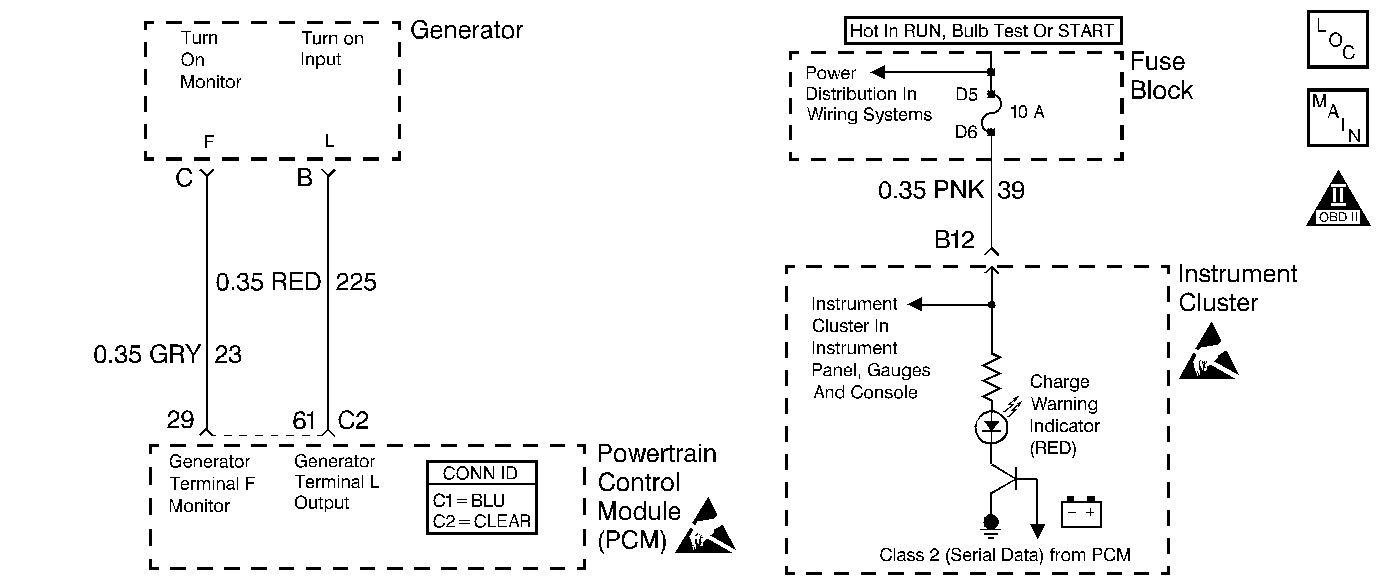
Circuit Description
The Powertrain Control Module (PCM) monitors system voltage on the PCM ignition feed circuit. If the system voltage is out of tolerance, DTC P0560 will be set. When the conditions that set DTC P0560 are present, operation of some vehicle systems and components may be affected.
Conditions for Running the DTC
The engine is running more than 650 RPM.
Conditions for Setting the DTC
| • | The system voltage monitored at the PCM ignition feed circuit is below 9.0 volts or above 16.0 volts. |
| • | The above conditions are for more than 25 seconds. |
Action Taken When the DTC Sets
| • | The PCM will illuminate the malfunction indicator lamp (MIL) during the second consecutive trip in which the diagnostic test has been run and failed. |
| • | The PCM will store conditions which were present when the DTC set as Freeze Frame/Failure Records data. |
Conditions for Clearing the MIL/DTC
| • | The PCM will turn OFF the malfunction indicator lamp (MIL) during the third consecutive trip in which the diagnostic has run and passed. |
| • | The history DTC will clear after 40 consecutive warm-up cycles have occurred without a malfunction. |
| • | The DTC can be cleared by using a scan tool. |
Diagnostic Aids
Inspect for the following conditions:
Poor connection or damaged harness--Inspect the wiring harness for damage. If the harness appears to be OK, observe the Ignition 1 voltage display on the scan tool while moving connectors and wiring related to the PCM, dash harness, and engine harness. A change in the display will indicate the location of the fault.
If DTC P0560 cannot be duplicated, reviewing the Failure Records vehicle mileage since the diagnostic test last failed may help determine how often the condition that caused the DTC to be set occurs. This may assist in diagnosing the condition.
Refer to Testing for Continuity , Testing for Intermittent Conditions and Poor Connections , Repairing Connector Terminals and Connector Repairs in Wiring Systems.
For complete information and additional diagnostics for the vehicle charging system, refer to Charging System Description in Engine Electrical.
Step | Action | Values | Yes | No |
|---|---|---|---|---|
1 | Did you perform the Powertrain On-Board Diagnostic (OBD) System Check? | -- | ||
2 | Is DTC P1635 also set? | -- | ||
3 |
Is Ignition 1 voltage between the specified values? | 10.0-16.0 V | ||
4 |
Does the scan tool indicate this DTC failed this ignition? | -- | Go to Diagnostic Aids | |
5 |
Does the DMM show battery voltage between the specified values? | 10.0-16.0 V | ||
6 |
Does the DMM show battery voltage between the specified values? | 10.0-16.0 V | ||
7 |
Does the DMM display voltage near the specified value with the GEN L Term commanded on? | 5.0 V | ||
8 | Compare the Ignition 1 voltage displayed on the scan tool with the actual battery voltage read with the DMM. Does the scan tool Ignition 1 value closely match the actual value read with the DMM? | -- | Go to Diagnostic Aids | |
9 |
Was a problem found? | -- | ||
10 |
Was a problem found? | -- | ||
11 |
Was a problem found? | -- | ||
12 |
Was a problem found? | -- | Go to Diagnostic System Check - Engine Electrical in Engine Electrical | |
13 |
Important: : The replacement PCM must be programmed. Replace the PCM. Refer to Powertrain Control Module Replacement/Programming . Is the action complete? | -- | -- | |
14 |
Is Ignition 1 voltage between the specified values? | 10.0-16.0 V | System OK |
